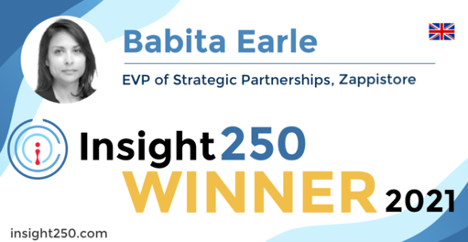


Jennifer serves as Managing Director for respondi which focuses on creating direct relationships with consumers for the market research and marketing sectors through opinion platforms and communities across Europe. She is also a Board Member for the Market Research Society.

James serves as CEO of Opinium, a consultative insight agency headquartered in London and New York that delivers research and insight innovation to leading brands. James and his team at Opinium have led the industry in not only their innovative and consultative approach to insights, but in their approach to employee ownership and wellbeing, and their quest to use research for good, helping accelerate change in our industry, and society. He is also a Member of an array of industry associations, including ESOMAR, Insights Association, the Market Research Society and the British Polling Council.
The Insight250 spotlights and celebrates 250 of the world’s premier leaders and innovators in market research, consumer insights and data-driven marketing. The inaugural list was revealed this April and created renewed excitement across the industry whilst strengthening the connectivity of the market research community.
With so many exceptional professionals named to the Insight250 it seems fitting to tap into their expertise and unique perspectives across an array of topics. This new weekly series will focus on doing just that; inquiring about the expert perspectives of many of these individuals in a series of short topical features.
This edition features three exceptional experts who deliver data insights for an array of leading organisations – Jennifer Perry, Managing Director of Respondi, Babita Earl, Executive Vice President of Strategic Partnerships for Zappi and James Endersby, Chief Executive Officer of Opinium.
With lockdowns and shutdowns forcing so many into isolation this past year, mental health has become an issue of paramount importance for so many. I sat down with James, Babita and Jennifer to get their perspectives on a spectrum of topics around prioritising, preserving and protecting mental health based on their expertise and experiences.
Crispin: During COVID we have seen the increased adoption of technologies and innovations to support remote working like Zoom and Teams. Has this improved people’s mental wellbeing? If not, what can we learn to do so or to mitigate against the downsides?
Jennifer: “I believe this has and continues to be a double edged sword, of course – the benefit of continued communication is wonderful through these methods and has all the positives of not having to travel for a meeting and being flexible at home for example, but I do think it’s allowed us to forget the different characteristics of extroverts and introverts that you would have accounted for in a face to face office environment. Those that don’t want to be on camera for every meeting – turning your camera off definitely comes with a notion of not being interested or not paying attention! I think we’ve replaced even the regular phone call with a camera on Zoom which brings a heap of anxiety for most. Don’t forget the power of just an old phone call.”
Babita: “I don’t think it is the technology that has impacted mental health, in many ways it has helped people stay connected and be able to operate businesses and continue working in lock down, the alternative would have been worse. We have seen so many benefits of people being able to work from great locations, work more flexibly and see the future of work through a very different lens.
“What has had an impact is being thrown into a completely remote environment and organisations not being prepared to help employees create new working structures, guardrails
and expectations to alleviate the need to be always on, the slippery slope of working from home!
For example, it is important to keep virtual calls short and be creative with remote working apps,
learning how to use new digital asynchronous working tools such as retro boards and Miro which aids collaboration and drives creativity. The challenge has also been learning new habits to balance an ‘all-day zoom’ routine with non-screen time activities such as, more walking meetings, an intentional start and finish to the day and making sure regular breaks are introduced throughout the day. This is easier said than done. Being remote has really helped us appreciate the value of real human interaction and now that lockdown is slowly coming to an end I hope we are able to experience the best of both worlds.”
James: “While we’ve all no doubt been ‘zoomed out.’ It’s important to remember that without this increased adoption of technologies and innovation, the work-from-home (WFH) experience would have been significantly impacted. As it stands, we’ve all had very different experiences. In our 2020 Workplace Mental Wellbeing series across multiple industries we saw a very mixed bag, with around 40% telling us WFH has increased their mental wellbeing, 42% telling us it had decreased their mental wellbeing and 18% said it had had no impact at all. This is why it is so important as we emerge from our lockdowns that insight leaders, both agency side and clients, really work closely with their people to ensure they plan out the next phase very carefully indeed to ensure they make the right decisions for all their people.”
Crispin: Why is protecting mental health so important for innovation?
James: “Simply put, poor mental health seriously impacts creativity. Creativity and innovation go hand in hand.”
Jennifer: “Experts say there is a link between creativity and happiness. An article from Huffington Post cited a recent New Zealand study which says that “engaging in creative activities contributes to an upward spiral of positive emotions, psychological well-being, and feelings of flourishing in life.” If we don’t protect one of the most important parts of our being, how can we flourish and grow both personally and professionally?”
Babita: “I think protecting mental health is important – full stop – and not just for innovation. We have all been through a highly unique time. Could you hear yourself in 2019 predict that in 2020 the whole world would effectively come to standstill and that you would be permanently working from home or furloughed, whilst for some, managing homeschooling and in fear of catching a deadly virus? I believe we are yet to see the full impact of this on all of our mental health. So it is important to ensure we all have releases whether it is running, yoga or journaling. It is these moments when you are most relaxed and away from screens that generate the best ideas, new ways of tackling problems, and are at your most innovative.”
Crispin: James, tell us more about the Global Mental Wellbeing Survey and how can people participate?
James: “Our Opinium Employee Research team created our Workplace Mental Wellbeing Audit a few years ago and we mainly use it in our work with global clients to help them understand, monitor and support the workplace mental wellbeing of their staff. At Opinium one of our core values is to use ‘research for good’ and, so three years ago, we partnered with the Market Research Society (MRS) to support our agency and in-house colleagues, and to conduct a workplace mental wellbeing audit of the UK research and insights sector. Three years on and we’ve just launched our third annual audit. MRS Members were emailed the survey this week.
“We’re hoping to see another year of positive change as our results last year showed. Insight leaders are clearly listening to the recommendations, however there is still much work to be done. Our Opinium US team will also launch our second annual audit with the Insights Association and we also hope to team up with the Research Society in Australia, and to launch a global audit with ESOMAR later in the year.”
Crispin: Jennifer, tell us about the MRBA and how it can help people in the UK – are there similar bodies globally. Where should people get help?
Jennifer: “The Market Research Benevolent Association (MRBA) exists to provide financial support and advice to individual colleagues experiencing real hardship, who work or have worked in any aspect of market research in the United Kingdom. We offer support with respect, sensitivity and in confidence. The MRBA totally relies on the generous donations and support from individuals and organisations across our industry.
“Obviously during the pandemic, we’ve been incredibly busy supporting those that have lost their jobs, lost loved ones and financially supporting those with diagnosed mental health issues to get the help they need so desperately.
“To add to this, we also work tirelessly to be able to offer MRBA Skills, our paid bursary programme for those wanting to progress their career by taking the MRS Advanced Certificate
You can find us at www.mrba.org.uk if you, or you know someone needs help.”
Crispin: Babita, diversity, Inclusion and mental wellbeing are often linked – what would be your top tips for companies to embrace best practice and ensure they set-up to innovate?
Babita: “They are very much linked. Imagine being in an environment where you feel like an outsider, consistently undervalued and overlooked for progression, for no reason other than the colour of your skin, gender or sexuality or even how you speak. Being in such an environment is going to have an inevitable impact on self-esteem and general mental health and then you end up with people who are talented and ambitious simply walking away. The 2020 D&I survey commissioned by the MRS highlighted that only 32 percent of people interviewed felt our industry is an inclusive place and that reduces to 9 percent of ethnic minority researchers, discrimination and inappropriate behaviour is frequent and and 29 percent of those in self employed positions chose that route linked to DE&I challenges
“And retaining diverse talent is key – it is well known that diverse organisations, particularly at a leadership level outperform others by as much as 25 percent. In my experience the best ideas come together when you have a group of people that represent all walks of life. So what should companies do:
- Sign the MRS Inclusion Pledge – get leadership accountability and investment to drive greater diversity and equity.
- Be ready to listen and learn from those within and outside your organisations – face your issues head on.
- Measure and set clear KPIs on gender parity, diversity of employees.
- Adopt a flexible first working policy to ensure everyone is able to work in the way that suits them.
- Ask for help, partner with great organisations such as WiRE, Core and MRSPride.
- Review recruitment and talent retainment – work with grassroot organisations and apprenticeships to ensure people of all backgrounds are provided the support, training and structure to succeed.
Crispin:The notion of work-life balance is becoming increasingly difficult to achieve given the ‘always on’ 24/7 smartphone world we live in. Talk about the importance of unplugging and stepping back and how to effectively do this.
Babita: “I love Spill – which is an online app to access mental health resources such as one-off advice or a therapist session. At Zappi we have made this available to everyone.”
Jennifer: “Since the pandemic began, I’ve noticed with myself and my peers how much we lack in the skills of setting boundaries – accentuated more than ever being at home for over a year now – starting early because you’re up and about, skipped lunch breaks because you can snack whilst working in your own kitchen, late evenings and weekends because there isn’t much else to do during lockdown – it really is a powerful skill to acquire – a few baby steps towards that could be a phone bowl in a different room for a set hour, at night – don’t charge your phone next to where you sleep – or it’ll be the last thing you look at night, and the first thing you look at in the morning and maybe set an actual lunch hour – and use the full hour. As I said, we find this so hard, as I think we are all so grateful to still have a business and work to be done, so are working harder than ever – I try to remind my team, there is no respondi if there is no us.”
James: “We must remember that we have effectively been sleeping at the office. I definitely think a lot of damage has already been done here in the past 12 months. Employees have found it incredibly hard to unplug and separate work from homelife. Many used to use the commute home to separate work from home. Now most are working their commute hours anyway, then closing their laptops and switching to their phones. While agency life has always been about a bit of flex, I definitely think we need to see guidance and advice on policies to help protect employees here. Another issue is of course some, perhaps with family commitments, might prefer to log off early and then catch up later, totally fine, but I think we need a conversation here to ensure that their colleagues then don’t feel compelled to answer those emails, messages, etc. Even though that person wasn’t necessarily expecting an immediate answer.”
Crispin: What innovations have you seen or would you like to see that help employees protect their mental well being?
James: “I quite like the sound of some tech that, after certain hours, prompts the sender on whether it is vital that the email or message be sent immediately or wait until morning. Also, Calm for Business, the mindfulness and meditation app, is a great option. We’re considering using it. We also give every employee £60 in an Urban Services account every month so they can get an in-home massage, manicure, yoga session or personal training session for some self-care.”
Jennifer: “I love apps like Headspace or Calm, making mental health wellbeing accessible and easy for all. However, as with work-life balance – you have to be pretty regimented to stick to this every day. Despite specialising in the online world of big data and online research, I’m pretty old school when it comes to looking after my mental health (I am diagnosed with depression and anxiety and have taken antidepressants since I was young). I’m a firm believer of knowing when to rest, talking and helping others which is therapeutic in itself. Share your story – you’d be surprised how great that can feel.”
In conclusion, mental health is a foundational building block to any successful organisation. The responsibility lies with the organisation fostering a culture that strengthens mental health with its expectations, approaches, policies and the tools it provides to employees. Strong mental health is also the responsibility of the individual to prioritise their wellbeing needs and unplugging to provide those self-care moments. When this is done on a macro organisational level and a micro individual level mental health not only becomes stronger, but also a genuine competitive advantage to the company in order to innovate and drive success.
TOP TIP
Jennifer: “Keep talking – on any platform. As an industry of talkers and storytellers as our craft, we often forget to just ask “how are you?” or even “how am I?”
Babita: “My best ideas come from when I am away from my screen. Spend more time thinking and it will make your doing more powerful.”
James: “Working from home has clear and obvious benefits for the wellbeing of employees. However, there are also positives to office working. The key is to be flexible and encourage a culture that works on a person-by-person basis.”


